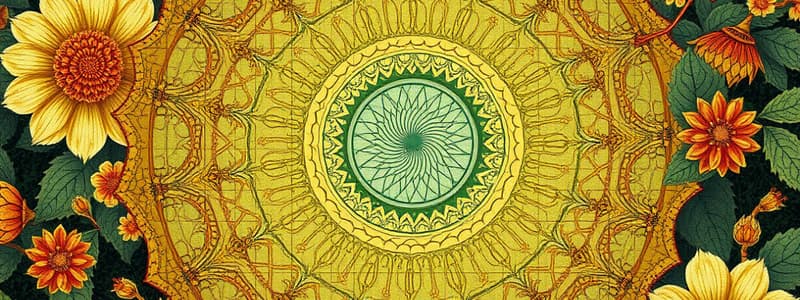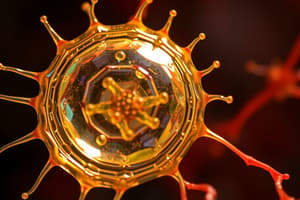Podcast
Questions and Answers
Who is credited with discovering and describing cells while examining cork?
Who is credited with discovering and describing cells while examining cork?
- Robert Hooke (correct)
- Theodor Schwann
- Anton van Leeuwenhoek
- Matthias Schleiden
The cell theory states that all living organisms are made of cells.
The cell theory states that all living organisms are made of cells.
True (A)
Which of the following statements is not part of the cell theory?
Which of the following statements is not part of the cell theory?
- All living things are composed of one or more cells.
- All cells arise from non-living matter. (correct)
- Cells are the basic unit of life.
- All cells come from pre-existing cells.
What is only found in eukaryotic cells?
What is only found in eukaryotic cells?
Prokaryotic cells have membrane-bound organelles.
Prokaryotic cells have membrane-bound organelles.
Which domain includes organisms with prokaryotic cells?
Which domain includes organisms with prokaryotic cells?
Which of the following is responsible for synthesizing proteins?
Which of the following is responsible for synthesizing proteins?
The rough endoplasmic reticulum is studded with ribosomes and is involved in protein synthesis.
The rough endoplasmic reticulum is studded with ribosomes and is involved in protein synthesis.
What is the function of the Golgi apparatus?
What is the function of the Golgi apparatus?
What is the first step in the process of protein synthesis in eukaryotic cells?
What is the first step in the process of protein synthesis in eukaryotic cells?
The smooth endoplasmic reticulum synthesizes proteins.
The smooth endoplasmic reticulum synthesizes proteins.
After being synthesized in the rough ER, where are proteins typically sent for modification and sorting?
After being synthesized in the rough ER, where are proteins typically sent for modification and sorting?
Which of the following cytoskeletal elements is involved in chromosome movement during cell division?
Which of the following cytoskeletal elements is involved in chromosome movement during cell division?
Microfilaments help with cell movement and are made of the protein actin.
Microfilaments help with cell movement and are made of the protein actin.
Which cytoskeletal structure is the thickest and helps maintain the shape of the cell?
Which cytoskeletal structure is the thickest and helps maintain the shape of the cell?
What is the primary function of the cell membrane?
What is the primary function of the cell membrane?
The cell membrane is primarily composed of a phospholipid bilayer.
The cell membrane is primarily composed of a phospholipid bilayer.
Which of the following is not found in the plasma membrane?
Which of the following is not found in the plasma membrane?
Which of the following organelles is referred to as the 'powerhouse' of the cell?
Which of the following organelles is referred to as the 'powerhouse' of the cell?
Lysosomes contain digestive enzymes and break down cellular waste.
Lysosomes contain digestive enzymes and break down cellular waste.
Which organelle is responsible for detoxification and lipid synthesis?
Which organelle is responsible for detoxification and lipid synthesis?
Which of the following is only found in plant cells and not in animal cells?
Which of the following is only found in plant cells and not in animal cells?
Both animal and plant cells contain a cell wall.
Both animal and plant cells contain a cell wall.
What structure provides plant cells with rigidity and protection?
What structure provides plant cells with rigidity and protection?
What molecule is primarily produced by the mitochondria and used as the energy currency of the cell?
What molecule is primarily produced by the mitochondria and used as the energy currency of the cell?
Photosynthesis occurs in the mitochondria of plant cells.
Photosynthesis occurs in the mitochondria of plant cells.
Which of the following is not involved in the production or storage of energy in cells?
Which of the following is not involved in the production or storage of energy in cells?
Which structure is responsible for cell division in animal cells?
Which structure is responsible for cell division in animal cells?
The nucleus is responsible for storing genetic material and controlling cellular activities.
The nucleus is responsible for storing genetic material and controlling cellular activities.
What is the function of the nucleolus within the nucleus?
What is the function of the nucleolus within the nucleus?
Flashcards are hidden until you start studying
Study Notes
Cell Theory
- Robert Hooke discovered cells while examining cork.
- Cell theory states that all living organisms are composed of cells.
- All cells come from pre-existing cells; not from non-living matter.
Prokaryotic vs. Eukaryotic Cells
- Eukaryotic cells contain a nucleus, distinguishing them from prokaryotic cells.
- Prokaryotic cells lack membrane-bound organelles.
- The Bacteria domain is composed of prokaryotic organisms.
Organelles and Functions
- Ribosomes are crucial for protein synthesis.
- Rough endoplasmic reticulum (ER) is involved in protein synthesis due to its ribosome coating.
- Golgi apparatus functions in protein modification and packaging.
Protein Delivery Pathway
- Translation in ribosomes is the initial step of protein synthesis in eukaryotic cells.
- Smooth endoplasmic reticulum does not synthesize proteins.
- Proteins synthesized in the rough ER are sent to the Golgi apparatus for modification and sorting.
Cytoskeleton
- Microtubules are essential for chromosome movement during cell division.
- Microfilaments, made of actin, facilitate cell movement.
- Microtubules are the thickest cytoskeletal elements, maintaining cell shape.
The Cell Membrane
- The primary function of the cell membrane is to regulate the passage of materials into and out of the cell.
- The cell membrane consists mainly of a phospholipid bilayer.
- DNA is not present in the plasma membrane, while phospholipids, proteins, and cholesterol are.
Organelles in Animal Cells
- Mitochondria are known as the "powerhouse" of the cell because they produce ATP.
- Lysosomes contain digestive enzymes for breaking down cellular waste.
- Smooth ER is responsible for detoxification and lipid synthesis.
Differences Between Animal and Plant Cells
- Chloroplasts are unique to plant cells and absent in animal cells.
- Only plant cells possess a cell wall, providing rigidity and protection.
- Both cell types do not share a cell wall, as animal cells lack this structure.
Energy Production
- Mitochondria primarily produce ATP, the energy currency of cells.
- Photosynthesis does not occur in mitochondria; it takes place in chloroplasts of plant cells.
- Ribosomes do not play a role in energy production or storage.
Additional Structures in Animal Cells
- Centrioles are involved in cell division in animal cells.
- The nucleus stores genetic material and regulates cellular activities.
- Nucleolus within the nucleus is responsible for ribosome synthesis.
Studying That Suits You
Use AI to generate personalized quizzes and flashcards to suit your learning preferences.




